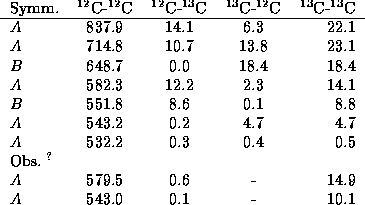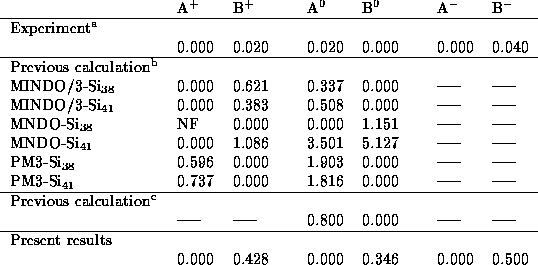References



Next: About this document
Up: Dynamic Properties of
Previous: References
References
- 1
-
G. D. Watkins in, Radiation Damage in Semiconductors, Ed \
P. Barach, (Dunod,Paris 1964), 97.
- 2
-
A. R. Bean, and R. C. Newman, Solid State Commun. 8, 175 (1970).
- 3
-
R. C. Newman, and A. R. Bean, Rad. Eff. 8,189 (1971).
- 4
-
G. D. Watkins, and K. L. Brower, Phys. Rev. Lett. 36, 1329 (1976).
- 5
-
L. W. Song, and G. D. Watkins, Phys. Rev. B. 42, 5759 (1990).
- 6
-
R. Wooley, E. C. Lightowlers, A. K. Tipping, M. Claybourn, and
R. C. Newman, Mat. Sci. Forum 10-12, 929 (1986).
- 7
-
J. F. Zheng, M. Stavola, and G. D. Watkins, The Physics of
Semiconductors, ed. D. J. Lockwood, World Scientific, Singapore, (1994)
p 2363 .
- 8
-
M. Besson, and G. G. DeLeo, Phs. Rev. B 43, 4028 (1991).
- 9
-
M. J. Burnard and G. G. DeLeo, Phys. Rev. B 47, 10217 (1993).
- 10
-
J. Tersoff, Phys. Rev. Lett. 64, 1757 (1990).
- 11
-
R. B. Capaz, A. Dal Pino,Jr., and J. D. Joannopoulos, Phys. Rev. B
50, 7439 (1994).
- 12
-
A. Mainwood, Mat. Sci. Forum, Trans. Tech. Publications, to be published,
(1995).
- 13
-
A. K. Tipping, and R. C. Newman, Semicond. Sci. Technol. 2,
315, (1987).
- 14
-
L. W. Song, X. D. Zhan, B. W. Benson, and G. D. Watkins, Phys. Rev. B. 42,
5765 (1990).
- 15
-
G. E. Jellison, J. Appl. Phys. 53, 5715 (1982).
- 16
-
K. P. O'Donnell, K. M. Lee, and G. D. Watkins, Physica B 116,
258 (1983).
- 17
-
G. Davies, and M. C. do Carmo, J. Phys. C. 14, 1687 (1981).
- 18
-
K. Thonke, H. Klemisch, J. Weber, and R. Sauer, Phys. Rev. B
24, 5874 (1981).
- 19
-
R. C. Newman, and R. S. Smith, J. Phys. Chem. Solids 30, 1492 (1969).
- 20
-
G. B. Bachelet, D. R. Hamann, and M. Schlüter, Phys. Rev. B 26, 4199 (
1982).
- 21
-
S. Öberg, P. K. Sitch, R. Jones, and M. I. Heggie,
Phys. Rev. B.
51, 13138 (1995).
- 22
-
M. J. P. Musgrave, and J. A. Pople, Proc Roy Soc A268, 474-84 (1962).
- 23
-
R. Jones, and S. Öberg, Phys. Rev. B 44, 3673 (1991).
- 24
-
R. Jones, P. Leary,
S. Öberg, and V. J. B. Torres,
Mat. Sci. Forum, Trans. Tech. Publications,
to be published, (1995).
- 25
-
R. Jones, J. Goss, C. Ewels, and S. Öberg,
Phys. Rev. B, 50, 8378, (1994).
- 26
-
G. Davies, and R. C. Newman, in Handbook on Semiconductors,
3, ed. by S. Mahajan, Elsevier (1994), p 1557.
- 27
-
K. Thonke, A. Teschner, and R. Sauer, Solid State Commun., 61, 241,
(1987).
FIGURE CAPTIONS
Figure 1. The ground state configuration of the interstitial carbon defect
in Si. The atoms with reduced coordination numbers are marked.
Figure 2. The A-form of the di-carbon defect. The defect can be thought
of as a C  defect bound to a substitutional carbon atom.
defect bound to a substitutional carbon atom.
Figure 3. The B-form of the di-carbon defect. This defect is a bond centered
silicon atom lying between two substitutional carbon atoms.
Figure 4. The pseudo-wavefunctions of the carbon interstitial defect
in Si. The white triangle represents the carbon atom, and its nearest
Si neighbors are represented by white circles.
(a) Wavefunction of second highest occupied state, (110) plane,
(b) Wavefunction of highest occupied state (110) plane,
(c) Wavefunction of lowest unoccupied state (110) plane.

Table: Structural data of the C  and C
and C  -C
-C  defects in Å . Here,
the subscripts indicate the coordination of the atoms involved, with reference
to Figures 1-3.
defects in Å . Here,
the subscripts indicate the coordination of the atoms involved, with reference
to Figures 1-3.

Table: Experimental and calculated LVMs, cm  , of the C
, of the C  defect, and
their downwards isotope shifts
defect, and
their downwards isotope shifts

Table: Experimental and calculated LVMs, cm  , and
their downwards isotope shifts of
the B-form of C
, and
their downwards isotope shifts of
the B-form of C  -C
-C 

Table: Relative total energies (eV) for the A and B forms of the di-carbon
defect with varying charge state.
 Reference 14.
Reference 14.
 Reference 9.
Reference 9.
 Reference 12.
Reference 12.
Antonio Resende
Wed Jan 15 12:41:08 GMT 1997
![]() defect bound to a substitutional carbon atom.
defect bound to a substitutional carbon atom.

![]() and C
and C ![]() -C
-C ![]() defects in Å . Here,
the subscripts indicate the coordination of the atoms involved, with reference
to Figures 1-3.
defects in Å . Here,
the subscripts indicate the coordination of the atoms involved, with reference
to Figures 1-3.
![]() , of the C
, of the C ![]() defect, and
their downwards isotope shifts
defect, and
their downwards isotope shifts
![]() , and
their downwards isotope shifts of
the B-form of C
, and
their downwards isotope shifts of
the B-form of C ![]() -C
-C ![]()

![]() Reference 14.
Reference 14. ![]() Reference 9.
Reference 9. ![]() Reference 12.
Reference 12.